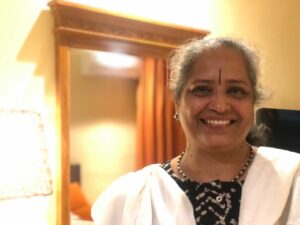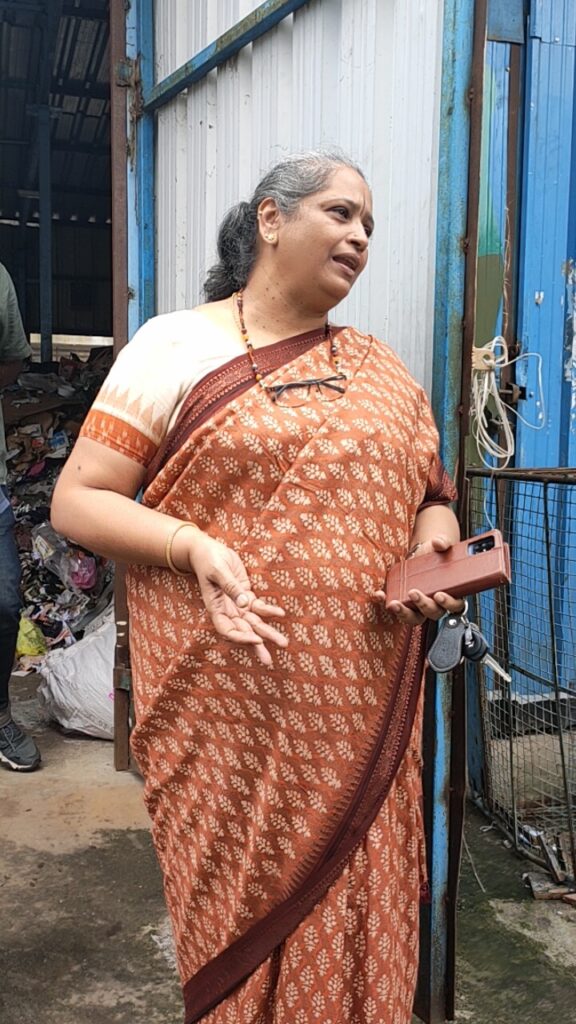Nalini Shekar: Giving Waste Pickers Dignity and Legitimacy
by Sherma Benosa

Homecoming Nalini Shekar saw at once the missing piece in Bangalore’s solid waste management program — the waste pickers.
The regrettable non-inclusion of waste pickers in the conversations on, ironically, the very issue in which they played a central role had Nalini ditching her plans to retire — the reason she and her husband came back to the city in the first place.
Within months of her arrival in 2010, Nalini, who had been away from Bangalore for 23 years, co-founded Hasiru Dala (“Green Force” in the local language) with the aim of integrating the waste pickers into the city’s formal waste management system.
“There were talks about decentralized waste management in the city. But they weren’t talking about the people who were being infringed on. You can’t talk about decentralized waste management without the waste pickers. But they were not included in the discussion. They were invisible, so we started organizing them to give them continued access to recyclables,” said the social worker who, 13 years prior, co-founded a trade union of waste pickers in Pune — the Kagad Kach Patra Kashtakari Panchayat or KKPKP — and worked for years on human rights issues in the United States.
Sadly, it was not only in the discussions on issues affecting them that the waste pickers were excluded but in every aspect of life as they were virtually invisible in society.
“When we are born, we are issued a birth certificate. Many of the waste pickers who belonged to the Dalit community didn’t have that,” Nalini shared.
The Dalit or untouchables form the lowest rung in India’s caste system. They were faceless, nameless, and unpaid laborers doing the “dirty work” like dealing with waste.
“Most of them didn’t have any kind of identity, even though they have stayed in the community for ages — 10 years, 20 years, 40 years…” Nalini added.
Without any identification cards, the waste pickers were not only unable to access social services, but they also lived and died without any records that they existed.
Worse, waste picking was not considered legitimate labor, and people did not recognize their extraordinary contribution to the city, so none of the waste pickers were paid for the work they did. Instead, they made money by selling the recyclable materials they collected from their waste picking, which only amounted to less than two dollars on a good day.
“So my main issue was how to integrate the waste pickers in the local solid waste management system so they can have a predictable income, and at the same time, look at how they could access social security or social entitlement,” Nalini said.
Unable to secure social services, most of the waste pickers were homeless. They lived under bridges and on pavements with no amenities for decent living. Waste picking was also challenging because they did not have access to the waste as efficient waste collection was demanded of the citizens by the local body. They wandered the streets and landfills looking for recoverable materials. They were harassed by the public, and even by the police, for doing their work.
“So we thought, let’s change the circumstances in which they work. If we have a better door-to-door collection system, if we have a center where they can do their sorting of waste instead of doing it in the streets, their life will be better,” Nalini said.
Hasiru Dala’s first two courses of action involved organizing the waste pickers and providing them training to improve their waste collection system and professionalize their work. They taught the waste pickers proper collection systems and other skills like organic waste management. They also gave them grooming sessions and taught them how to conduct themselves when talking to people, like the homeowners they will encounter daily. They also worked with the city to establish dry waste collection centers.
Hasiru Dala likewise engaged with the city to issue identity cards to the waste pickers. After several policy dialogues and court interventions, the local government finally issued identity cards that contained their basic information and identified them as waste pickers, finally authorizing them to collect waste within the jurisdiction of the city.
Having the right to manage waste meant that some waste pickers no longer had to take the risk of wandering the streets to do their work. Some even fearlessly offered their services to apartment dwellers and bulk waste generators.
“With this particular identification card, which is almost identical to the mayor’s, the harassment started to go down. The waste pickers’ life became better. Their children now have an identity to go to school. They started getting bank accounts. They were able to apply for different life entitlements like pensions and scholarships for their children,” Nalini shared.
Seeing the positive outcome of their interventions, Hasiru Dala proceeded to work on the waste pickers’ housing issues by engaging with the city once more.
“Housing is the key. You bring in a lot of stability with housing,” Nalini shared. “It brought in security and opportunities for the waste pickers’ children. So we have done a lot of work around it, even upgrading the housing we have, using used materials, thus reducing the ecological footprints in construction. Many donors came forward to share the materials they did not need after demolition or redoing their home, which helped.”
Thus far, Hasiru Dala has changed the lives of nearly 20,000 waste pickers. They have recorded 16,169 social services that were availed from 2021 to 2022; 11,380 occupational identity cards issued; 272 school enrollments and re-admissions among the first generation learners among waste pickers’ children; and 1,597 scholarships and educational loans provided.
Hasiru Dala estimates showed that on average, a waste picker collects about 60-90 kilograms of waste per day. With 15,000 waste pickers in Bangalore, this translates to savings of 84 crores (INR 840 million or USD 10.2 M) for the city per annum.
For her work, Nalini has received numerous accolades, among them the Kempegowda Award in 2015 from the City of Bangalore. In the same year, she was chosen by BBC News as one of the 100 women in India who make a difference in society.
But for Nalini, the things that make her proud the most are the remarkable changes that happened in their community. Where before, the waste pickers were invisible, now they have a voice.
“Participation of the waste pickers was key in our advocacy,” she shared, adding that their stand in policies are informed by the realities on the ground and are a result of consultations with the waste pickers. “If we need to respond to a bill, for example, we explain the provisions to the waste pickers in a simple way. And then we get their feedback,” she said.
She added: “All our strategies are co-created with the waste pickers. When there is co-creation and there is participation, there is also buy-in from the waste pickers in everything we do. We think we are successful because of that,” she said.
Now, 12 years after she came home to retire only to start an advocacy, Nalini does not see herself retiring anytime soon, but she admits that she is considering changing roles in the next few years. “I may relegate my operations role,” she said. “I think there’s still so much more to be done, but I think we’re in the right direction. I also know that we have developed so much leadership in the community; the things that were not there are now there, and work will go on. I’m sure that things will be carried on. I think we are in a very good place now,” she said.
Nalini shared that the empowerment of the community forms the pinnacle of her work. “I feel that what I’m most proud of is that the waste pickers have come to take charge of the profession, they’ve made connections, and they’re not only bringing change to their own community and their own family but also contributing very heavily to the climate mitigation space.”
Nalini herself is amazed at how massive the change has been. “The community is taking care of its own issues. The waste pickers themselves are now talking about their own rights. In the past, they would let people talk about them in whatever way. But now they talk about themselves. They know that their contribution has helped the city economically. So they’re very proud of themselves. Now they stand up and say, ‘Yes, I’m a waste picker and I’m proud to say … that I contribute economically to my city to reduce their solid waste management cost,’” Nalini shared.
She added that the waste pickers are likewise confidently sharing knowledge with others. “These are people who don’t know how to read and write, but they are teaching others about the importance of segregation, how to do segregation, and how climate change is mitigated through their work. They do it beautifully. They are articulate and they share knowledge with the public who otherwise didn’t see them as important people in society because they’re all from the Dalit community — the outcast community — and there was a lot of distance people maintained with them,” she said.
Nalini underscored that change was also apparent in the community. “Previously, when you asked the public about waste pickers, they’d say: ‘They are dirty and they are poor.’ But if I ask the same question today to a similar kind of group, they’d say: ‘Oh, they are environmentalists, they are essential workers.’ So the perception has changed. Maybe not in 100% of Bangalore but to a significant number of people who are engaged in public spaces. They all know that a huge difference is happening,” she said.
And that huge difference, that massive change that Nalini sowed when she decided to delay her retirement will surely bring a big smile on her face every time she’d look back in the future when she’d finally said “I’ve done enough,” knowing that not only did she try to make a difference but that she also gave it her all and succeeded — in a big way. And what’s more, she inspired many others to do the same.
Some “retirements” are not the end of a life-changing experience; sometimes, it is the beginning.










